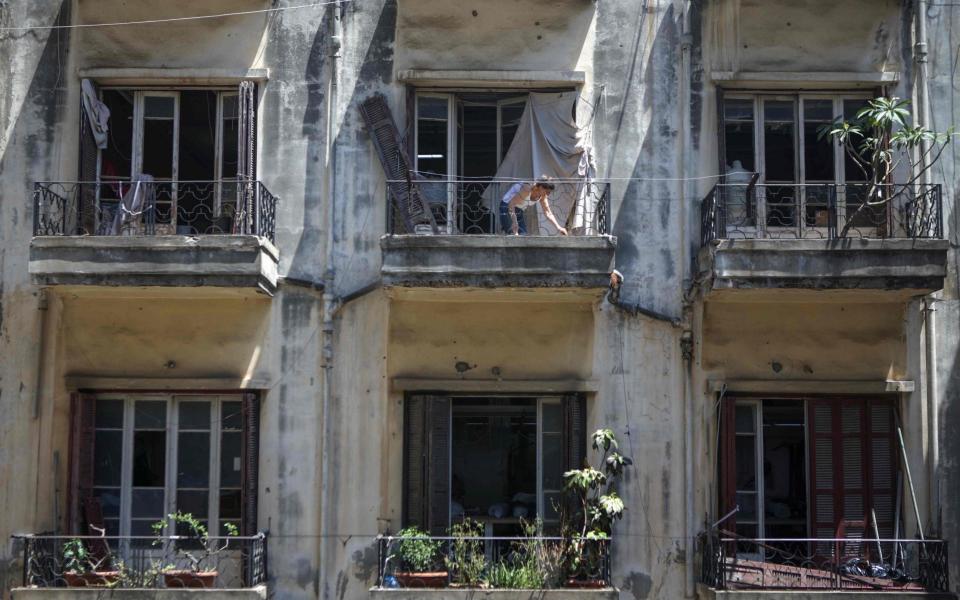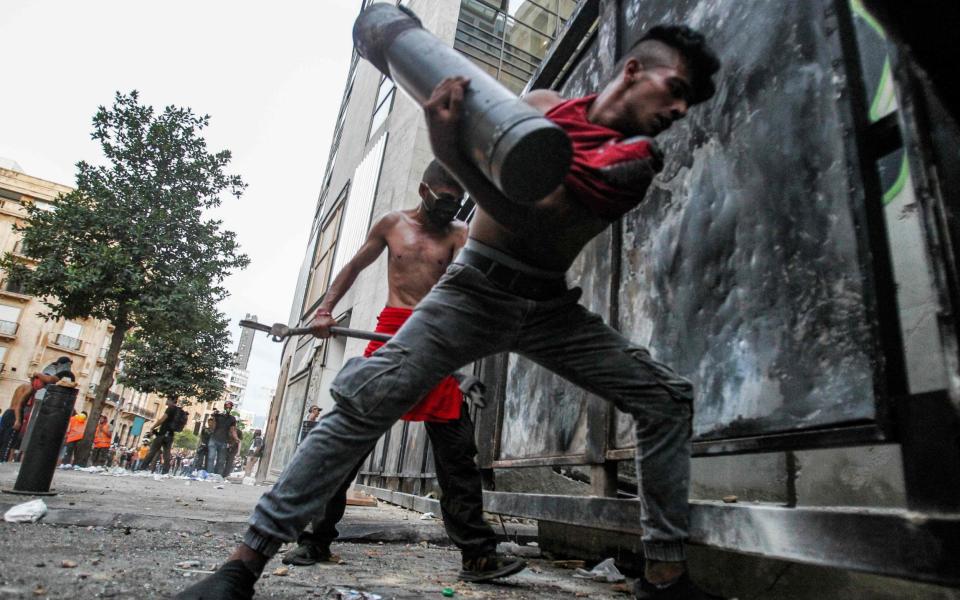Lebanon’s volunteer army: clean up by day, revolution at night

In a busy street in Beirut’s Mar Mikhail neighbourhood, a shirtless Lebanese man in a hard hat holds a gloved fist aloft as he marches with his shovel to his next job.
Down the road hundreds of young volunteers in fluorescent vests are picking up glass or awaiting their next orders.
Nearby in a bustling tent headquarters, teams of urban planners are mapping the destruction, while clean up crews are dispatched to damaged homes, and food and medical care are offered to the needy.
“This is a civic movement of individuals who have regrouped in absence of government,” says Peter Mouracade of civil society group Muwatin Lebnene, who is trying to organise the chaos.
“This is all done by volunteers and a phone that never stops ringing.”
In the week since a devastating explosion of 2,750 tons of ammonium nitrate destroyed large parts of Beirut, thousands of Lebanese from across the country have mobilised spontaneously to clear the devastated capital and help an estimated 300,000 people who were made homeless in the immediate aftermath of the blast.
Fuelled by caffeine, cigarettes and a few hours sleep a night, volunteers swept streets and shoveled rubble, rapidly transforming the city’s three worst-affected neighbourhoods - while government officials were notable mainly by their absence.

Not content with cleaning up the mess they say was the product of a failed system of governance, these volunteers say they now want to build a new Lebanon out of the wreckage.
Within moments of the port blast so powerful it stopped clocks at 6.08pm, Lebanese turned to their phones to check on loved ones and offer each other assistance.
Karim Hobeiche started a WhatsApp group with five friends that soon swelled to 30. “It was spontaneous but it’s becoming a bit more organised every day and a bit more coordinated,” he says. “When we hear about someone that has needs, we share their details on WhatsApp, their location, and we go there with our shovels and brooms.”
These groups grew and connected with others until there were dozens of informal tent headquarters across the city from which volunteers could deploy.
Many had never volunteered before, while others were seasoned activists who developed networks during a nationwide anti-government protest movement that started last October calling for the reform of the country’s sectarian governance system, which allows leaders to remain in power via entrenched systems of patronage and nepotism.
“We are the new government, we are trying to emulate how we want to be represented,” says Mouin Jaber, a 28-year-old television producer.
To effect lasting change and prevent future disasters like the blast, which Mr Jaber blamed on a corrupt and negligent government, the ruling elite that has dominated the country since the end of the 1975-1990 civil war will have to be dislodged.

“We are dividing our schedule between helping the people who were affected by the blast in the mornings and protesting in the afternoon,” he says.
At a gazebo in Martyrs’ Square in downtown Beirut, Carole Atallah notes that the blast has reinvigorated the country’s protest movement, which had been on hold due to the coronavirus pandemic. “Now we are volunteers, tonight we are fighters,” says the middle-aged museum worker from Jounieh, a coastal city north of Beirut.
Protesters celebrated the cabinet’s resignation on Monday but say they will continue demanding systemic reform, while organising themselves in the expectation of early elections.
“We have to be ready with a list of candidates who are vetted, who are respected, who can win the confidence of the people,” says Ayah Bdeir, a tech entrepreneur who co-founded the group Daleel Thawra, which serves as a directory of the protest movement.
But the real challenge will be to convert people power on the street into a force that can pressure established parties to allow reform of a system that benefits them.
“The problem is that those who want change are not as organised and do not have the resources and institutional capacities of those who are invested in the system,” says Bassel Salloukh, an associate professor of political science at the Lebanese American University Beirut. “A lot of people continue to be vested in this system,” he says, not just a handful of billionaires at the top.
But with international attention on Lebanon, many hope that the blast will provide the shock the country needs to change.
“The international community’s eyes are on us,” says Ms Bdeir. “We want to take advantage of that and show that we are a country with a rich pool of talented candidates who are qualified to run the country.”


